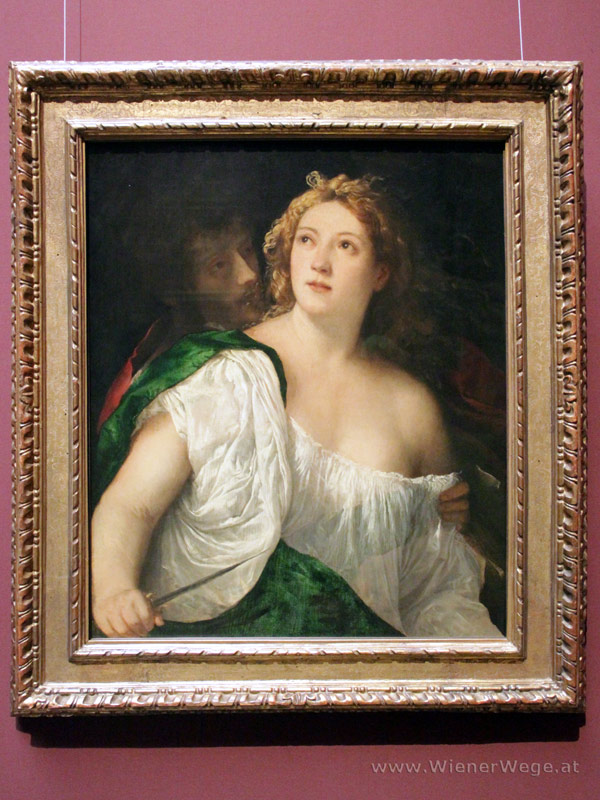


e The Legend of Good Women, ur varzhoneg eus 1380 gant Geoffrey Chaucer,.Hervez ar vojenn eta eo war-lerc'h gwallidigezh Lucretia e voe savet ar Republik e -509.Īnavezet eo istor gwallidigezh Lucretia dre an istorour roman Titus Livius, a gont an darvoud e dibenn e levr kentañ (chap. Neuze ez eas ar wazed a oa en-dro dezhi da sevel ar bobl, ha Lucius Junius Brutus en o fenn, o tiskouez korf ar wreg lazhet, hag int ha kerzhout war-du Roma.Įrru eno e savjont ar bobl adarre a-enep tiegezh ar roue, ha diskar ar roueelezh.Įdo ar roue Lucius Tarquinius Superbus o vrezeliñ pellik diouzh Roma, setu e rankas distreiñ buanañ ma c'hallas, met pa zegouezhas e oa kloz perzhier kêr, ma rankas mont en harlu da Etruria. Goude displegañ dezho petra a oa c'hoarvezet, ha goulennet digante he dialañ, en em lazhas dirake gant ur gontell.

Pa voe aet kuit an torfedour e c'halvas Lucretia he zad hag he fried ha Lucius Junius Brutus a oa gante. Un deiz ma oa bet pedet mab ar roue gant e bred da di an daou bried e wallas Lucretia, hag e reas evel-se daou dorfed war un dro: unan a-enep ur wreg roman, unan all enep lezennoù an degemerusted. Brudet e oa he c'hened ha brudetoc'h c'hoazh he vertuz.Īr roue Tarquinius, pe Lucius Tarquinius Superbus ( superbus, a dalv kement ha "lorc'h ennañ"), roue diwezhañ Roma, en doa ur mab, Sextus Tarquinius, un den feuls ha drouk, en doa c'hoant da louzañ vertuz ar wreg feal. Merc'h e oa da Spurius Lucretius ha gwreg da Lucius Tarquinius Collatinus. Then its own brother butted with its horns, and rammed at me, and with that blow I was brought to a fall then thrown on the ground and sorely hurt, as I lay on my back I saw in the sky a thing most mighty and most wonderful-the sun’s flame-beaming orb melted away to the right hand in a new course.Lucretia ( Lucrezia en italianeg) zo ur vaouez eus istor mojennel Roma, hervez m'eo kontet gant Titus Livius. When now at night’s onset I duly gave my body to rest, soothing weary limbs with sleep, I saw a vision in a dream-a shepherd drove towards me a woolly flock of surpassing beauty two brother-rams were chosen from among them, and I sacrificed the nobler of the two. Proud? He himself speaks of it in Accius’ Brutus- Tarquinius 17–38Ĭicero: What manner of dream was that of Tarquin the. Brutus and Collatinus became the first consuls at Rome, where a republic was now set up. Brutus returned to Ardea, and gained the support of the army, but Tarquin found Rome closed against him. Lucretia’s body was escorted to Rome Brutus, who was tribunus celerum, told the people of the outrage, and Tarquin and his family were banished. Under Brutus’ guidance the people of Collatia resolved to renounce Tarquin and all his house.

When Lucretia had told her story and killed herself, Brutus threw off his pretended stupidity, and agreed to help Collatinus in avenging her. 25terrae Pareus in terra Kayser terra cdd.25 Exin prostratum terra, graviter saucium, resupinum in caelo contueri maximum ac mirificum facinus: dextrorsum orbem flammeum radiatum solis liquier cursu novo. Deinde eius germanum cornibus conitier, in me arietare, eoque ictu me ad casum dari. Tarquinius Quoniam quieti corpus nocturno impetu dedi sopore placans artus languidos, visust in somnis pastor ad me adpellere 20 pecus lanigerum eximia pulchritudine duos consanguineos arietes inde eligi praeclarioremque alterum inmolare me. At Collatia they found Collatinus’ wife Lucretia spinning with her handmaidens, and Sextus, burning with lust for her, outraged her 17–38Ĭicero, de Div., I, 22, 44: Cuius nam modi est Superbi Tarquini somnium? De quo in Bruto Acci loquitur ipse. During the siege, Tarquin’s sons and their cousin Tarquinius Collatinus visited their homes to test the virtue of their wives. While he was besieging Ardea, Tarquin was further troubled by a dream which, according to the soothsayers, foretold that Rome would soon become a commonwealth. But the most definite omen, which foretold that Lucius Junius Brutus (whom all thought to be stupid) would reign at Rome after Tarquin, passed unnoticed. Lucius Tarquinius Superbus, king of Rome, at the height of prosperity, was worried by certain prodigies which boded trouble for him.


 0 kommentar(er)
0 kommentar(er)
